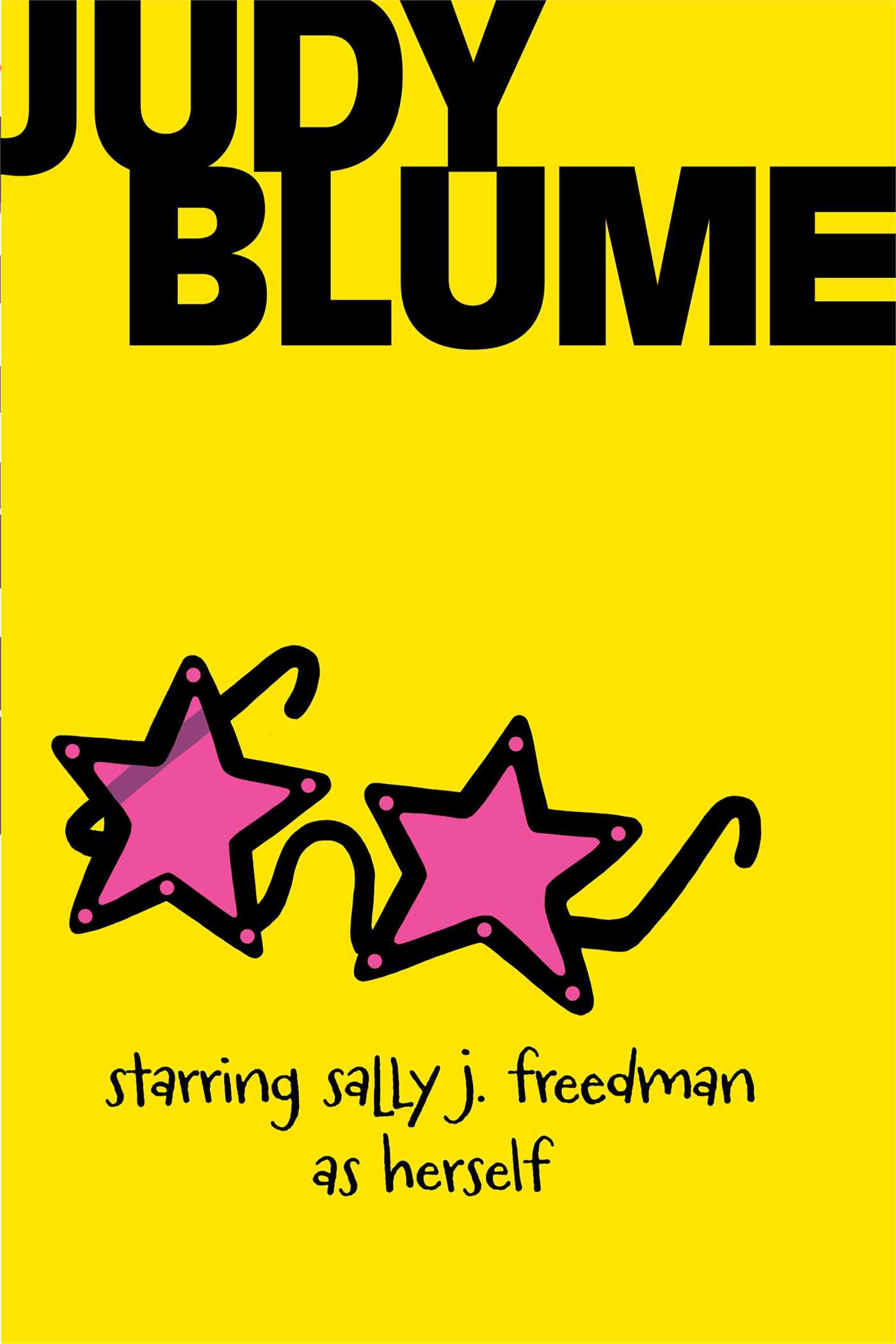Starring Sally J. Freedman as Herself
By Judy Blume
LIST PRICE $8.99
PRICE MAY VARY BY RETAILER
Free shipping when you spend $40. Terms apply.
Buy from Other Retailers
Table of Contents
About The Book
Sally investigates post-WWII Florida with theatrical flair in this classic middle grade novel from Judy Blume. Now with a fresh new look!
Sally J. Freedman was ten when she made herself a movie star. She would have been happy to reach stardom in New Jersey, but in 1947 her older brother Douglas became ill, so the Freedman family traveled south to spend eight months in the sunshine of Florida. That’s where Sally met her friends Andrea, Barbara, Shelby, Peter, and Georgia Blue Eyes—and her unsuspecting enemy, Adolf Hitler.
Dear Chief of Police:
You don’t know me but I am a detective from New Jersey. I have uncovered a very interesting case down here. I have discovered that Adolf Hitler is alive and has come to Miami Beach to retire. He is pretending to be an old Jewish man...
While she watches and waits, and keeps a growing file of letters under her bed, Sally’s Hitler will play an important—though not quite starring—role in one of her grandest movie spectaculars.
Sally J. Freedman was ten when she made herself a movie star. She would have been happy to reach stardom in New Jersey, but in 1947 her older brother Douglas became ill, so the Freedman family traveled south to spend eight months in the sunshine of Florida. That’s where Sally met her friends Andrea, Barbara, Shelby, Peter, and Georgia Blue Eyes—and her unsuspecting enemy, Adolf Hitler.
Dear Chief of Police:
You don’t know me but I am a detective from New Jersey. I have uncovered a very interesting case down here. I have discovered that Adolf Hitler is alive and has come to Miami Beach to retire. He is pretending to be an old Jewish man...
While she watches and waits, and keeps a growing file of letters under her bed, Sally’s Hitler will play an important—though not quite starring—role in one of her grandest movie spectaculars.
Reading Group Guide
Discussion Guide for
Starring Sally J. Freedman as Herself
By Judy Blume
1. Setting is the time and place in which a novel takes place. What is the setting of this book? Explain how the events and daily lives of the characters help establish the setting.
2. Conflict in a novel is the problem to be solved. Identify the conflict of this novel. At what point is the conflict revealed? Many of Blume’s novels are told in first person. This novel is in third person. Discuss the difference in first- and third-person perspectives. Explain why telling this novel in third person is especially effective.
3. Describe Sally’s family. Discuss her relationship with her parents. How is Sally especially close to her grandmother, Ma Fanny? Who are Aunt Bette and Uncle Jack? What are their roles in the story? What is Sally’s relationship with Douglas, her older brother? Explain how their age difference defines their relationship. Discuss what Mrs. Freedman means when she accuses Douglas of chasing trouble.
4. Sally’s father says that her mother worries a lot. Cite evidence that his claim is true. How does she worry more about what might happen, rather than what does happen? Explain how her worries prevent her from doing exciting things. What is Mrs. Freedman’s greatest adventure? How does having Ma Fanny along help?
5. Explain what Uncle Jack means by “Little pitchers have big ears.” (p. 15) How does her family’s secrecy about things cause Sally’s imagination to spike? Cite evidence throughout the novel that Sally has a vivid imagination. How does Sally’s imagination sometimes cause her trouble?
6. In New Jersey, Sally likes to make up stories when playing with her friends in her playhouse. One story she likes to dramatize is about Hitler’s concentration camps. Who are Tante Rose and Lila, the characters in her story? Later she imagines Mr. Zavodsky as Hitler. Debate whether Sally has a full understanding of the Holocaust.
7. Douglas is fragile from a recent illness, and Mr. and Mrs. Freedman think he needs a warmer climate. They look for an apartment in Miami. What does Sally’s dad mean when he says he had to pay “under the table” to get a place to lease? Describe the apartment in Miami. How is living in such a small space an adjustment for Sally and her family?
8. Dr. Freedman wants Sally to be adventurous. Chart the many adventures that Sally experiences from the time they leave New Jersey through their entire year in Miami. Select one of Sally’s adventures in Miami and retell it as if to her friends in New Jersey.
9. Sally encounters segregation on the train to Miami. How does her mother explain it to her? Identify other times in the novel when Sally is aware of segregation. Explain what Dr. Freedman means when he tells Sally that the north isn’t much better.
10. What is Sally’s first impression of her school in Miami? How does she feel out of place? Sally relates all the bad things about her first day to her grandmother. How does Ma Fanny respond to Sally’s first-day experiences? At what point does Sally begin to feel that she belongs?
11. Describe the friends that Sally makes in Miami. Sally and her friends are in the fifth grade. They aren’t really adolescents, but they have adolescent concerns. Identify typical adolescent behaviors among Sally and her friends. Andrea is a year older than Sally. How does Andrea contrast fifth and sixth grade? Discuss the way the boys interact with the girls. Debate whether the boys are immature when they call breasts “tiddly winks.”
12. Sally learns that Aunt Bette is expecting. How is she naïve about what this means? Sally asks her mom how a woman gets pregnant. Explain why her mother doesn’t give an explanation, but buys her a book instead. Why doesn’t her mother want her to show the book to Douglas? Sally learns that Bubbles Daniels, a teenage neighbor, is pregnant. How does Ma Fanny react when she hears that Mr. and Mrs. Daniels are sitting shivah because of Bubbles’s condition?
13. Judy Blume says that this is her most autobiographical novel. Define autobiography. Discuss what Blume might have been like as a child after reading Sally’s story.
Guide written by Pat Scales, a retired middle and high school librarian who is currently a children’s and young adult literature consultant and specializes in curriculum and free speech issues.
This guide has been provided by Simon & Schuster for classroom, library, and reading group use. It may be reproduced in its entirety or excerpted for these purposes.
Starring Sally J. Freedman as Herself
By Judy Blume
1. Setting is the time and place in which a novel takes place. What is the setting of this book? Explain how the events and daily lives of the characters help establish the setting.
2. Conflict in a novel is the problem to be solved. Identify the conflict of this novel. At what point is the conflict revealed? Many of Blume’s novels are told in first person. This novel is in third person. Discuss the difference in first- and third-person perspectives. Explain why telling this novel in third person is especially effective.
3. Describe Sally’s family. Discuss her relationship with her parents. How is Sally especially close to her grandmother, Ma Fanny? Who are Aunt Bette and Uncle Jack? What are their roles in the story? What is Sally’s relationship with Douglas, her older brother? Explain how their age difference defines their relationship. Discuss what Mrs. Freedman means when she accuses Douglas of chasing trouble.
4. Sally’s father says that her mother worries a lot. Cite evidence that his claim is true. How does she worry more about what might happen, rather than what does happen? Explain how her worries prevent her from doing exciting things. What is Mrs. Freedman’s greatest adventure? How does having Ma Fanny along help?
5. Explain what Uncle Jack means by “Little pitchers have big ears.” (p. 15) How does her family’s secrecy about things cause Sally’s imagination to spike? Cite evidence throughout the novel that Sally has a vivid imagination. How does Sally’s imagination sometimes cause her trouble?
6. In New Jersey, Sally likes to make up stories when playing with her friends in her playhouse. One story she likes to dramatize is about Hitler’s concentration camps. Who are Tante Rose and Lila, the characters in her story? Later she imagines Mr. Zavodsky as Hitler. Debate whether Sally has a full understanding of the Holocaust.
7. Douglas is fragile from a recent illness, and Mr. and Mrs. Freedman think he needs a warmer climate. They look for an apartment in Miami. What does Sally’s dad mean when he says he had to pay “under the table” to get a place to lease? Describe the apartment in Miami. How is living in such a small space an adjustment for Sally and her family?
8. Dr. Freedman wants Sally to be adventurous. Chart the many adventures that Sally experiences from the time they leave New Jersey through their entire year in Miami. Select one of Sally’s adventures in Miami and retell it as if to her friends in New Jersey.
9. Sally encounters segregation on the train to Miami. How does her mother explain it to her? Identify other times in the novel when Sally is aware of segregation. Explain what Dr. Freedman means when he tells Sally that the north isn’t much better.
10. What is Sally’s first impression of her school in Miami? How does she feel out of place? Sally relates all the bad things about her first day to her grandmother. How does Ma Fanny respond to Sally’s first-day experiences? At what point does Sally begin to feel that she belongs?
11. Describe the friends that Sally makes in Miami. Sally and her friends are in the fifth grade. They aren’t really adolescents, but they have adolescent concerns. Identify typical adolescent behaviors among Sally and her friends. Andrea is a year older than Sally. How does Andrea contrast fifth and sixth grade? Discuss the way the boys interact with the girls. Debate whether the boys are immature when they call breasts “tiddly winks.”
12. Sally learns that Aunt Bette is expecting. How is she naïve about what this means? Sally asks her mom how a woman gets pregnant. Explain why her mother doesn’t give an explanation, but buys her a book instead. Why doesn’t her mother want her to show the book to Douglas? Sally learns that Bubbles Daniels, a teenage neighbor, is pregnant. How does Ma Fanny react when she hears that Mr. and Mrs. Daniels are sitting shivah because of Bubbles’s condition?
13. Judy Blume says that this is her most autobiographical novel. Define autobiography. Discuss what Blume might have been like as a child after reading Sally’s story.
Guide written by Pat Scales, a retired middle and high school librarian who is currently a children’s and young adult literature consultant and specializes in curriculum and free speech issues.
This guide has been provided by Simon & Schuster for classroom, library, and reading group use. It may be reproduced in its entirety or excerpted for these purposes.
Product Details
- Publisher: Atheneum Books for Young Readers (April 29, 2014)
- Length: 400 pages
- ISBN13: 9781481413558
- Ages: 8 - 12
- Lexile ® 620L The Lexile reading levels have been certified by the Lexile developer, MetaMetrics®
Resources and Downloads
High Resolution Images
- Book Cover Image (jpg): Starring Sally J. Freedman as Herself Trade Paperback 9781481413558
- Author Photo (jpg): Judy Blume Photo © Elena Seibert(0.1 MB)
Any use of an author photo must include its respective photo credit














